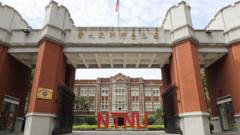A sports coach from National Taiwan Normal University (NTNU) in Taipei, Chou Tai-ying, has come under fire following allegations of coercing her students into donating blood for research projects. The controversy has sparked significant reaction and an internal investigation.
Taiwanese Coach Faces Backlash for Allegedly Coercing Students into Blood Donations

Taiwanese Coach Faces Backlash for Allegedly Coercing Students into Blood Donations
A sports coach at a Taiwanese university has formally apologized for exerting pressure on students to donate blood for research.
Chou, 61, stated she intended to assist her team, which suffered from a low number of players and frequent injuries, but specifics regarding the research's purpose remain unclear. The issue was first highlighted by Taiwanese politician Chen Pei-yu in 2024, claiming that students faced threats of losing academic credits if they declined to participate.
An internal investigation discovered that blood sampling commenced in 2019 and persisted until 2024 across various research projects. Chou expressed regret for any intimidation she may have imposed on her students, acknowledging her "reckless words and behavior." Her statement indicated a recognition of wrongdoing and a desire to rectify the situation.
Additionally, Professor Chen Hsueh-chih, who led some of the research projects, extended his apologies, admitting that their intentions were to support student-athletes but that they unintentionally caused harm. The investigation revealed troubling practices, including students providing blood samples frequently, with many samples disposed of due to improper procedures.
Chen Pei-yu accused the project of demanding students give three samples daily over a consistent two-week period, further intensifying concerns.
In response to the incident, NTNU's principal Wu Cheng-chi publicly apologized for the institution's oversight and vowed to reassess its ethical and regulatory protocols. Taiwan's deputy education minister confirmed a departmental review of the case, including actions taken by Chou and Chen. The education ministry also indicated potential repercussions for another women's football coach at NTNU, though the individual's identity remains undisclosed.
An internal investigation discovered that blood sampling commenced in 2019 and persisted until 2024 across various research projects. Chou expressed regret for any intimidation she may have imposed on her students, acknowledging her "reckless words and behavior." Her statement indicated a recognition of wrongdoing and a desire to rectify the situation.
Additionally, Professor Chen Hsueh-chih, who led some of the research projects, extended his apologies, admitting that their intentions were to support student-athletes but that they unintentionally caused harm. The investigation revealed troubling practices, including students providing blood samples frequently, with many samples disposed of due to improper procedures.
Chen Pei-yu accused the project of demanding students give three samples daily over a consistent two-week period, further intensifying concerns.
In response to the incident, NTNU's principal Wu Cheng-chi publicly apologized for the institution's oversight and vowed to reassess its ethical and regulatory protocols. Taiwan's deputy education minister confirmed a departmental review of the case, including actions taken by Chou and Chen. The education ministry also indicated potential repercussions for another women's football coach at NTNU, though the individual's identity remains undisclosed.




















